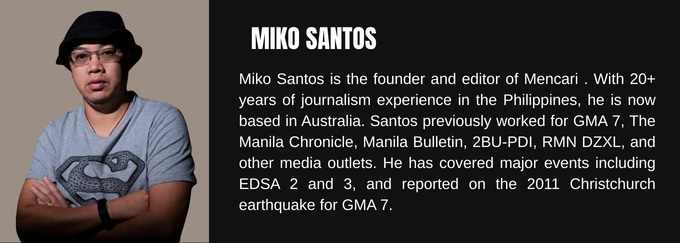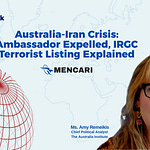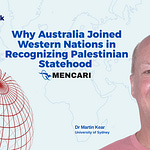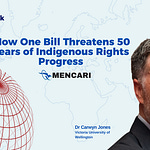This interview explores Australia’s current energy policy challenges through a conversation with a political leader advocating for change. At the heart of the discussion is a striking paradox: Australia is one of the world’s largest exporters of natural gas, yet the country is building import terminals to bring gas back at higher prices.
The speaker argues that current government policies are driving up electricity costs while failing to reduce emissions, costing taxpayers an estimated $75 billion to date with projections of over $500 billion more by 2035. The conversation examines the tension between meeting international climate commitments under the Paris Agreement and delivering affordable energy to Australian families and industries. Key policy proposals include streamlining environmental approvals for gas projects, opening new gas basins, and prioritizing energy affordability while still reducing emissions responsibly.
Truth matters. Quality journalism costs.
Your subscription to Mencari directly funds the investigative reporting our democracy needs. For less than a coffee per week, you enable our journalists to uncover stories that powerful interests would rather keep hidden. No corporate influence. No compromises. Just honest journalism when we need it most.
Five Key Takeaways
The LNG Export Paradox: Australia ranks as the world’s second or third-largest LNG exporter due to abundant natural gas reserves, yet the country is simultaneously constructing import terminals to purchase gas back at inflated prices—a situation the speaker characterizes as nonsensical for Australian consumers and industry.
Staggering Climate Policy Costs: Australia has already spent approximately $75 billion on emissions reduction efforts since 2005, with estimates suggesting an additional $500 billion will be required to meet the 2035 targets, even as power prices climb and emissions plateau or increase.
Environmental Approvals as Policy Bottleneck: The current environmental approval regime is identified as a critical obstacle preventing natural gas from reaching domestic markets, with accusations that government funding for environmental activist groups actively restricts supply expansion.
Paris Agreement Flexibility: While committed to the Paris Agreement framework, the speaker emphasizes that nationally determined contributions (NDCs) should be revised based on national interests and changing global circumstances, noting that many countries have already walked back or modified their commitments.
Gas as Transition Fuel Strategy: Natural gas is positioned as essential infrastructure serving three critical functions—industrial manufacturing, power generation, and emissions reduction as a transition fuel—making affordable gas access fundamental to both economic competitiveness and climate objectives.
Detailed Synopsis
This interview captures a pivotal moment in Australia’s ongoing energy policy debate, recorded during a visit to the Sutherland Shire area of Sydney. The conversation reveals deep tensions between Australia’s climate commitments and the practical economic pressures facing households and industries struggling with rising energy costs.
The discussion opens with firsthand observations from a powder coating facility, where rising gas and electricity prices are creating palpable economic strain. This real-world context frames the broader policy critique that follows. The speaker establishes a fundamental argument: that current national energy objectives are “working backwards” from unachievable long-term targets, driving electricity price increases in the process.
A central paradox emerges as the interview progresses. Despite Australia’s position as a global LNG powerhouse—the world’s second or third-largest exporter—domestic gas markets face supply constraints severe enough to justify building import terminals. This scenario, the speaker suggests, represents a policy failure that defies common sense for ordinary Australians experiencing energy bill shock.
The Paris Agreement becomes a key flashpoint in the conversation. When challenged about previous statements regarding “bureaucrats in Paris,” the speaker articulates a nuanced position: commitment to the Paris framework while reserving the right to revise Australia’s nationally determined contributions based on national interest. This position is contextualized within broader international trends, noting that many nations have modified or watered down their climate commitments as circumstances evolved.
Historical comparison provides quantitative weight to the argument. The speaker notes that over the 20 years since 2005, Australia has nearly doubled its emissions reduction efforts compared to developing nations. Meeting Labor’s 2050 targets would require doubling those efforts again—at a cost the speaker deems unsustainable given current economic pressures.
The critique extends to what the speaker characterizes as policy-driven supply restrictions. Environmental approval processes are identified as creating significant delays for gas projects, with the additional claim that government funding supports environmental activist organizations working to limit gas development. This creates a feedback loop that constrains domestic supply while Australia continues exporting LNG internationally.
The proposed alternative centers on what the speaker calls “stepping on the gas”—a policy framework that would streamline approvals, open new gas basins, facilitate private sector pipeline development, and recognize natural gas’s critical role across power generation, industrial use, and manufacturing. The fundamental principle articulated is that increased supply, coupled with grid balance and affordable energy as the primary objective, would deliver better outcomes for both prices and emissions.
Throughout the interview, the speaker emphasizes a commitment to honesty with voters about policy realities and costs, contrasting this approach with what’s characterized as misleading claims from the current government. The argument frames energy affordability not as opposition to climate action, but as essential to maintaining public support for realistic emissions reduction that matches technological capabilities and international comparability.
What Readers Will Learn
Policy Analysis Skills:
How to evaluate the real-world costs of climate policy implementation beyond headline targets
Understanding the relationship between energy supply dynamics and electricity pricing
Recognizing the gap between international climate commitments and domestic policy execution
Australian Energy Market Fundamentals:
Why Australia’s position as a major LNG exporter doesn’t automatically translate to domestic energy security
The role of natural gas in Australia’s energy transition and industrial base
How environmental approval processes impact energy project development timelines
Climate Policy Economics:
The financial scale of Australia’s emissions reduction efforts: $75 billion spent, $500 billion projected
How nationally determined contributions (NDCs) under the Paris Agreement function in practice
Why countries revise their climate commitments and the factors driving those decisions
Political Communication Strategies:
How policy positions are framed around “national interest” versus international agreements
The use of concrete examples (powder coating facilities, import terminals) to illustrate abstract policy critiques
Techniques for presenting alternative policy frameworks while maintaining climate credibility
Critical Thinking Applications:
Evaluating claims about emissions trends (reductions under previous government vs. current flatlines)
Understanding trade-offs between energy affordability and climate ambition
Recognizing how supply-side interventions (or restrictions) impact market outcomes
This is not a sponsored video/audio. A small commission will be paid to us if you purchase anything through some of the affiliate links in our product listings.
If you want to chat more about this topic, I would love to continue this conversation with you, over Twitter @realmikosantos!
This podcast is powered by Kangaroofern, Australia's Independent Podcast Management Company.
Thanks so much for listening to our podcast!
If you enjoyed this episode, be sure to subscribe so you'll be notified when a new episode is posted in the Apple podcast, Google podcast, Spotify, Stitcher or via RSS.
If you think others could benefit from listening, please share it on your socials.
You can also subscribe to the podcast app on your mobile device.
If you found value in this episode, leave us an Apple Podcast review. Ratings and reviews from our listeners are extremely valuable to us and greatly appreciated. They help our podcast rank higher on Apple Podcasts and expose our show to more awesome listeners like you.
This is a premium episode. If you would like to discuss this with other subscribers or get access to the episodes, visit Readmencari.com
Got a News Tip?
Contact our editor via Proton Mail encrypted, X Direct Message, LinkedIn, or email. You can securely message him on Signal by using his username, Miko Santos.
While mainstream media serves corporate interests, you deserve the truth.
Your Mencari subscription—less than a coffee per week—powers real independent journalism. Our reporters dig into the stories powerful people desperately want buried. No corporate masters. No political handlers. Just the uncomfortable truths that matter most right now.
This is journalism without compromise, funded directly by readers who refuse to be misled. If this reporting opened your eyes, hit Restack so others can see what they're missing.
Not ready to be paid subscribe, but appreciate the newsletter ? Grab us a beer or snag the exclusive ad spot at the top of next week's newsletter.













